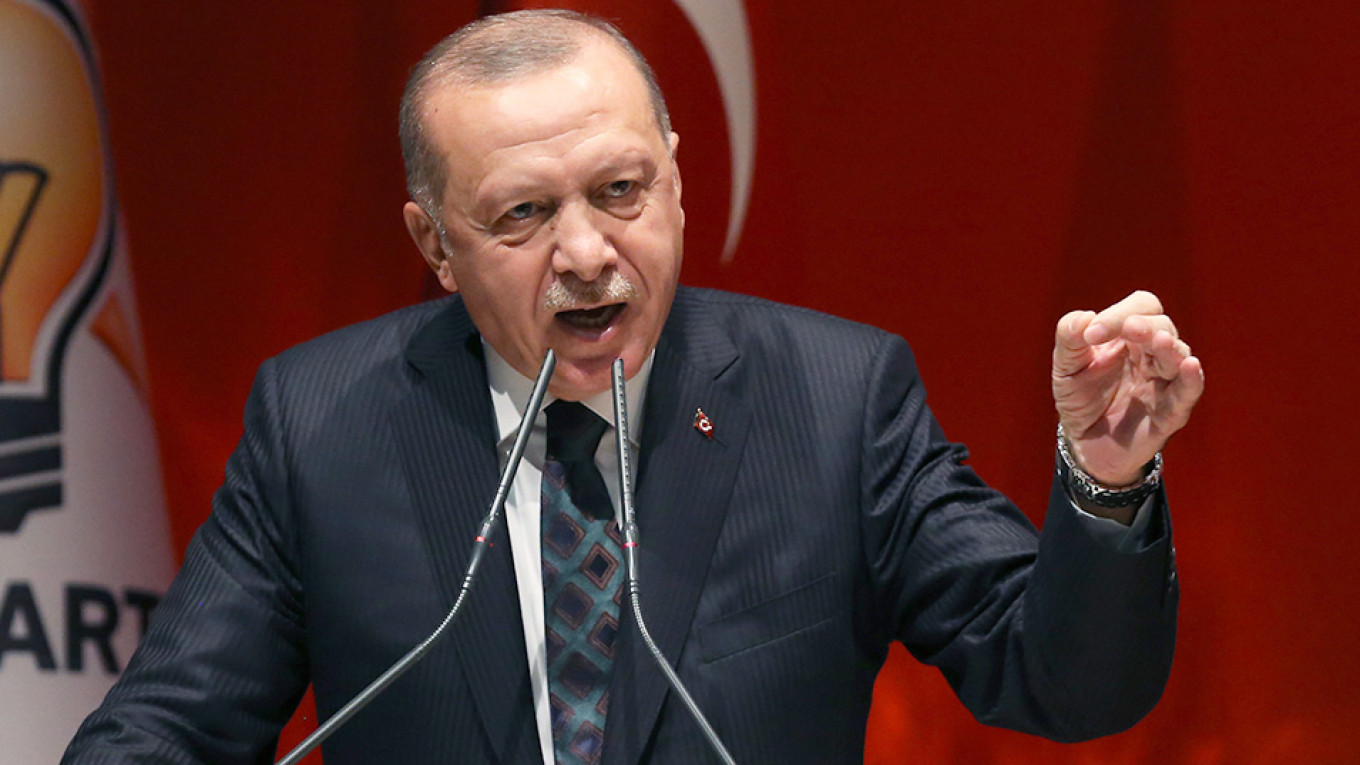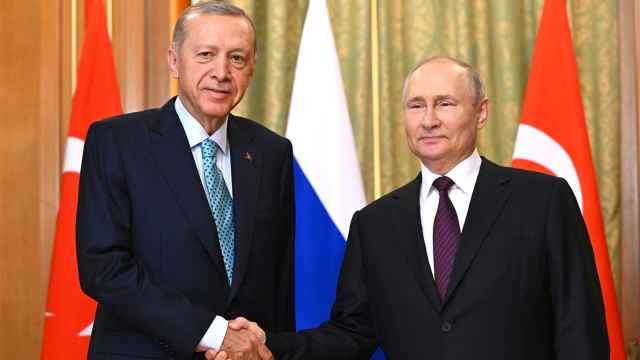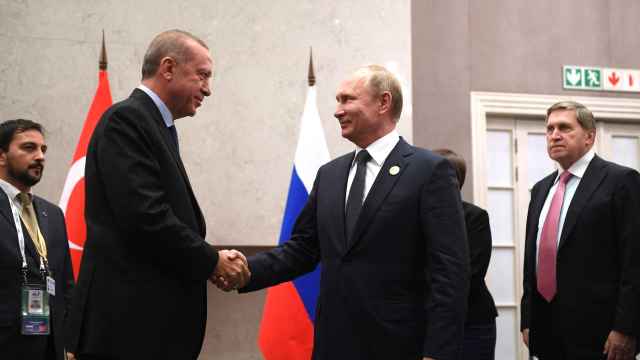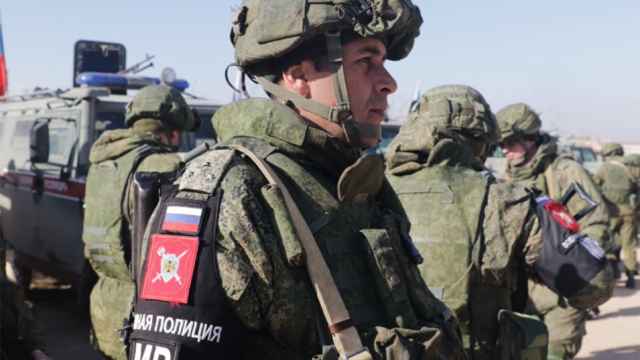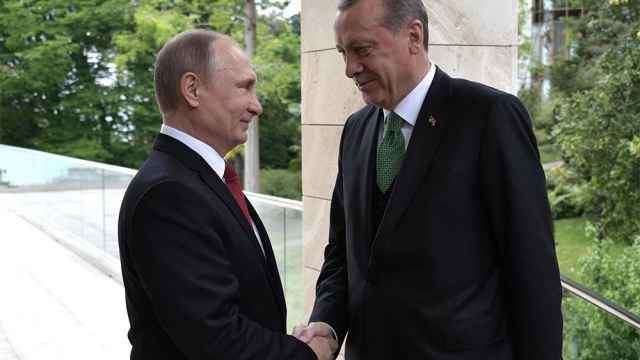The Kremlin’s denizens could be forgiven for thinking they’re hearing some muffled chuckling coming from the direction of Washington. Because Trump administration officials must be feeling some schadenfreude as they watch their counterparts in Moscow wrestle with a quandary all too familiar at the Pentagon and Foggy Bottom: How do you solve a problem like Recep Tayyip Erdogan?
The more philosophically-minded Russian officials may concede that turnabout is fair play: For several years now, they were the ones pointing and giggling as Turkey’s president strained his country’s ties with the U.S., deploying bellicose rhetoric against — and provocative behavior toward — American allies, from the Kurds in Syria, Israel and Greece to Egypt and the United Arab Emirates.
The Russians got more than just satisfaction from Erdogan’s truculence toward the U.S. President Vladimir Putin exploited the situation to weaken the North Atlantic Treaty Organization and to secure lucrative business deals with Turkey, from the sale of military hardware to gas pipelines.
To preserve his status as Erdogan’s new best friend, Putin indulged the Turkish leader’s regional and international ambitions. Following the example of two American presidents, Barack Obama and Donald Trump, Putin feigned deafness at Erdogan’s belligerent rhetoric against Russian allies, like the Syrian dictator Bashar al-Assad and the Libyan strongman Khalifa Haftar.
The Russian leader has even grinned and borne it when Erdogan’s actions foiled, or at least greatly complicated, his own ambitions. A Turkish military invasion of northwestern Syria has nixed any hope in Moscow that Assad would be able to reassert control over the country. Turkish troops and mercenaries now stand in the way of Khalifa’s seizure of Tripoli.
And, just as Erdogan has thumbed his nose at Washington by embracing those who chant “Death to America” — whether the regime in Tehran or the leadership of Hamas and the Muslim Brotherhood — Erdogan has now cocked a snook at Moscow with the incantation, “Slava, Ukraine!” at his recent visit to Kyiv. “Glory to Ukraine” has become a slogan of resistance to Russian hegemony since Putin’s 2014 annexation of Crimea. Moscow and its mouthpieces claim it is a Nazi chant.
The Russians are discovering, as Americans and Europeans have before, that with Erdogan, matters are always coming to a head, accompanied with threats to end alliances.
Putin now finds himself at the receiving end. In a recent phone call, Erdogan warned that Turkey would react “in the harshest way” if Turkish troops in Syria came under more attacks from Assad’s forces. And of course, he has warned that the Russo-Turkish relationship could split over Syria.
Blood has now been shed on both sides. Assad’s forces have stepped up attacks on Turkish positions in Idlib, killing several Turkish troops. Russia says some of its soldiers have been killed in attacks from Turkish positions. Hundreds of Syrians, soldiers and civilians alike, have been killed in the escalated fighting, and tens of thousands have been forced to flee the area, creating a new refugee crisis.
Putin’s options with Erdogan are limited. Turkey is potentially a major economic partner for Russia — the two leaders want trade between the two countries, currently at around $30 billion, to rise to $100 billion. Turkey’s membership is crucial to Russia’s hopes of sustaining multilateral organizations in the Caucasus and Central Asia. And of course, Putin wants to stoke NATO’s uncertainty over Turkey’s commitment to the alliance.
Erdogan knows all of this. If his dealings with the U.S. and Europe are any guide, he will keep pushing Russia for concessions, in Syria and Libya — and who knows where else.
Can Washington take advantage of the situation, as Russia did when Turkey’s ties to the U.S. frayed? Perhaps, but that would require Putin to push back against Erdogan, and the Turkish leader to show some interest in returning to the Western fold. We’re not there yet. If we do get to that point, the U.S. would have to display diplomatic craft of a high order — higher than it has demonstrated in recent years — to bring Erdogan in from the cold.
For now, though, American officials can quietly revel in Putin’s discovery of what it means to be Erdogan’s friend.
This article was first published by Bloomberg.
A Message from The Moscow Times:
Dear readers,
We are facing unprecedented challenges. Russia's Prosecutor General's Office has designated The Moscow Times as an "undesirable" organization, criminalizing our work and putting our staff at risk of prosecution. This follows our earlier unjust labeling as a "foreign agent."
These actions are direct attempts to silence independent journalism in Russia. The authorities claim our work "discredits the decisions of the Russian leadership." We see things differently: we strive to provide accurate, unbiased reporting on Russia.
We, the journalists of The Moscow Times, refuse to be silenced. But to continue our work, we need your help.
Your support, no matter how small, makes a world of difference. If you can, please support us monthly starting from just $2. It's quick to set up, and every contribution makes a significant impact.
By supporting The Moscow Times, you're defending open, independent journalism in the face of repression. Thank you for standing with us.
Remind me later.


